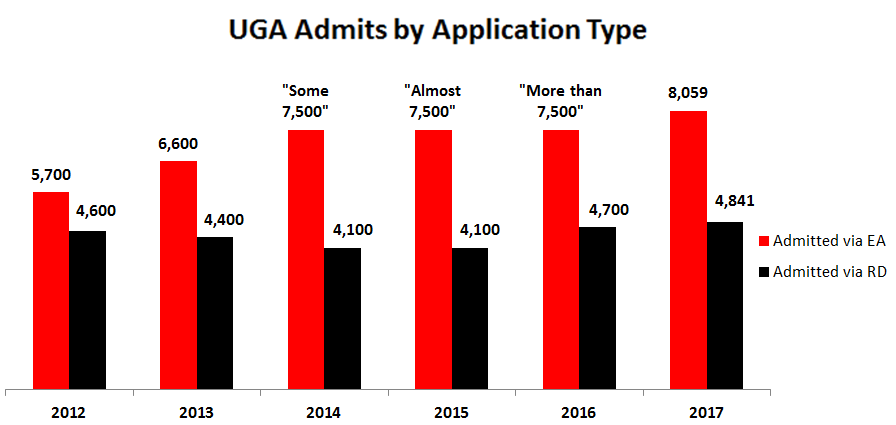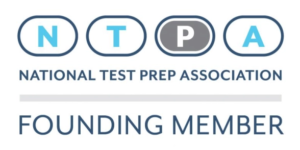UGA 2016 Early Action Musings: An Update of Our Popular 2014 Blog Post
Back in May 2014, we posted our original “All About UGA: Ruminations from the 2014 UGA Admissions Process” blog post, which has attracted more than 500% as many views as most of our other blog posts. Therefore, since UGA’s Early Action Admits were released this past Friday, we wanted to update our original post with additional data and commentary.
UGA is a school of particular interest to many of our clients, so we continue to do deep dives into its admissions trends and maintain a repository of UGA admissions data. Below is some information that should be of interest to all families that may have students applying to UGA in the next few years.
1) The number of admits via Early Action continues to rise.

While 2014-2016 Early Action admits appear to be flat, that’s only because the UGA press releases used vague notations of how many EA applicants were admitted: “Some 7,500/Almost 7,500/More Than 7,500.” Early admits have grown by 41% in the past five years, while academic statistics such as average GPA/SAT/ACT/AP/IB have continued to grow simultaneously. This is a testament to the growing strength of the UGA applicant pool.
More specifically:
- The average number of AP/IB/Dual Enrollment classes of those accepted has steadily risen by about 0.5 AP classes each year, from 6 to 8.
- The average ACT score has risen by about a half-point per year as well, both at the bottom end and the top end. Important Note: UGA focuses on just the English and Math sections and de-emphasizes the Reading and Science sections.
- The average SAT has risen as well. (Hard to draw too many conclusions given the data available, e.g. average vs. median vs. middle 50%).
- The GPA for the bottom 25% of admitted students has grown from 3.74 to 3.91, while the average GPA has risen to 4.03. (Note: UGA recalculates students’ GPAs to count only core classes and adds extra points for AP/IB/DE classes.)

Just 4,777 students in Georgia got a single-day ACT score of 30 or higher last year, yet 30 was only the 25th percentile for those accepted into UGA via Early Action (meaning that 75% of students scored higher than this), and over 8,000 students were admitted via Early Action. 30 was also the overall ACT average for all of the rounds combined. How is this possible, especially given that not every high-scoring applicant even applies to UGA?Yes, some students submitted an SAT score (though many fewer than normal, due to the tumultuous SAT switch for the Class of 2017), but a huge contributing factor is that UGA “superscores” both the ACT and SAT (combines the best section scores from different dates). It’s a real game-changer. Savvy parents, counselors, and students understand the power of superscoring far better than they did back in 2012, driving average SAT/ACT scores at virtually all schools that superscore upwards. Also, remember that both parents and students tend to fib about their scores; fewer than 1,000 students earned a single-day 34, 35, or 36 last year in the entire state of Georgia (about 2-3 per county), and some of those weren’t even students — they were Edison Prep’s own tutors taking the test to stay on top of their game!3) Academic rigor continues to be far more important than extracurricular activities.
Back in April 2014, Senior Associate Director of UGA Admissions David Graves posted a quote on the UGA Blog that we still sincerely wish were included at the top of every UGA mailing: “When parents or students say that their schedule is already so busy with other activities that it is tough to handle challenging courses…instead of dropping rigorous courses, maybe an activity could be dropped.”
We tell students daily that no one has ever been ever rejected for having too low of a “play practice score,” but millions of applications are rejected each year for low GPA, low rigor, and/or low SAT/ACT scores. Activities matter if and once your core academic metrics are in the right ballpark. Fun Fact: 95% of students admitted to UGA in 2013 had at least one AP class. Avoiding that AP goose egg is crucial!
4) Applying via Early Action remains paramount.
As the bar graph above shows, a larger than ever number of students is admitted via Early Action. The UGA Admissions Blog goes to great lengths to explain to commenters that it is not easier or harder to be admitted EA vs. RD; it’s just a different timeline. As you can see in the table above, the academic stats for the full admitted pool vs. EA-only are relatively similar quantitatively, which just further strengthens the argument for applying early.
It is likely that if the statistically high-flying UGA Honors College applicants were removed from the rest of the EA pool, the resulting EA vs. RD stats would be near identical. What we can definitively state is that, by all means, unless you think that your statistics are so poor that you’ll be rejected during Early Action, apply during Early Action. As the table above illustrates, approximately 2/3 of the total annual spots are already gobbled up via Early Action. Therefore, students should try to compete while a reasonable number of spots still remain. Doing so implies trying to finish up standardized testing by June of junior year at the latest so that students can apply via Early Action (though EA applicants are still allowed to submit the Sept. ACT score and the Oct. SAT score for Early Action).
5)…But couldn’t I get rejected via Early Action?
Historically, only 4-7% of Early Action applicants get rejected. About 1,000 got rejected this past week out of the 15,614. The vast, vast majority of EA applicants who are not admitted are deferred, not denied. From 2012-2017, we’ve tutored 4,000+ students who applied to UGA and who hailed from over 100 high schools and over 25 Georgia counties. When comparing notes with our brain trust of 6-7 local college counselors, we realized that it has been several years since any of us has personally had a student rejected via Early Action, including students who had 0-2 APs, under a 3.3 UGA GPA, and/or lower than a 24 on the ACT. Furthermore, applying early is a relatively low-risk endeavor because any student who was close to gaining admission via EA who might benefit from having one extra semester of grades and/or a better SAT/ACT score would also be a strong enough applicant to at least get deferred.
6) If you are deferred via Early Action, write the essays!
Remember that while SAT/ACT is important (the second strongest factor), a high GPA combined with a rigorous curriculum will always be the single most important factor for admission. Keep up that GPA! Additionally, if UGA is on your student’s list, we’d highly encourage you to regularly read the UGA Admissions Blog regularly. UGA has one of the most responsive and high-touch blogs of any college admissions blog in America; David Graves does an amazing job.
Feel free to email us with questions at edison@edisonprep.com or call us at 404-333-8573!
Note: The immense amount of longitudinal data that went into this blog post is sourced at our UGA Statistics Repository Page.







